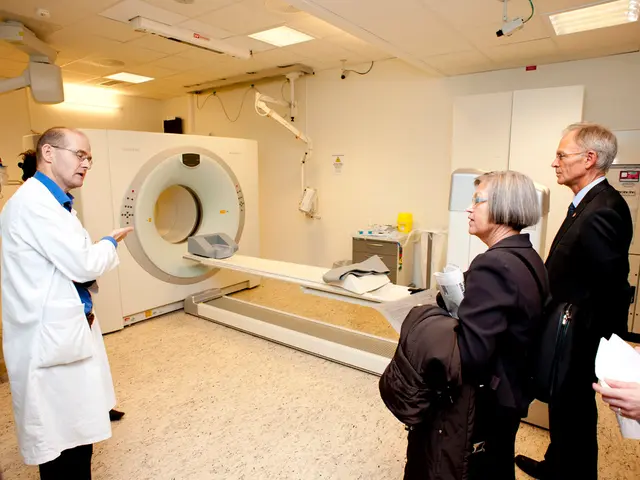Delving into the Groundbreaking Applications of Extended Reality (XR) for Education and Skill Development in the Year 2025
Embracing the Future: XR Training in Education and Beyond
As we step into the future, there's a technology stirring up excitement in the realm of learning and skill acquisition—Extended Reality (XR). This umbrella term encompasses Virtual Reality (VR), Augmented Reality (AR), and Mixed Reality (MR), all set to shake up the way we absorb and master new knowledge.
The transformative powers of XR training
XR training solutions are game-changers, offering not just fun, but crucial benefits that make learning more engaging, effective, and efficient. They provide safe, risk-free spaces for practice, especially beneficial in fields like healthcare and aviation. Cost-effective and scalable, these tech wonders eliminate the logistics headaches and offer tailored learning paths to suit diverse learning styles. Further, they promote remote collaboration, enabling learners to connect and share knowledge from anywhere, anytime.
2025: A year of XR advancements in training
By 2025, the developments in XR technology will blow us away! Here's a sneak peek at some groundbreaking XR technologies shaping the future of training:
- Hyper-realistic VR: With high-resolution displays, advanced rendering, and more powerful hardware at play, VR experiences will be almost indistinguishable from reality, providing a highly realistic, immersive training environment.
- Haptic Fidelity: Haptic technology will evolve, providing learners with a physical sense of touch when interacting with virtual objects. These advancements will heighten the realism and effectiveness of training.
- Gaze-based Interaction: Eye-tracking technology will pave the way for more intuitive interaction within XR environments, enabling learners to control and navigate the virtual world using their gaze.
- Multimodal Input: The integration of voice commands, gesture recognition, and other natural interaction methods will make XR training more fluid and user-friendly.
- AI and Machine Learning: AI and ML will be vital in personalizing XR training experiences, adapting the content to each learner's unique needs and progress.
XR's impact on education in 2025
By 2025, VR will become a ubiquitous presence in education and training, weaving its way effortlessly into key areas. Immersive simulations will allow learners to excel in mastering complex skills in safe settings, benefiting sectors like medicine and engineering. Virtual field trips will empower students to explore distant lands and cultures without leaving home. Furthermore, VR will boost collaborative learning by promoting teamwork in virtual classrooms, offering personalized experiences through AI and machine learning, and creating emotionally resonant experiences that aid knowledge retention.
Universities pioneering XR training
Universities worldwide are on a mission to enhance education through XR. Take, for example, Indiana University's Educational Innovation through Extended Reality Initiative (XRI), launched in 2021, with a focus on using Oculus Quest and MERGE Cubes for groundbreaking teaching practices. The initiative's 2024 project on music technology education aims to foster a deeper connection between students and technology by enriching the curriculum in music production and performance.
Similarly, Notre Dame's XR for Learning Working Group is exploring XR's educational potential. The group offers support in designing immersive learning experiences and evaluating their effectiveness, with the ultimate goal of fostering an engaging educational landscape where digital and physical realities intertwine.
AR's role in training
While VR may steal the spotlight, AR's potential in training is vast. By 2025, expect numerous AR applications, such as real-time contextual guidance overlaying information on physical surroundings, facilitating instant expert feedback during remote collaboration. AR's visual prowess will also aid in comprehending complex concepts and structures, boost user engagement with gamified training experiences, and provide invaluable aid for maintenance and repair tasks with step-by-step instructions directly on the equipment.
The future of training: XR's resounding impact
In conclusion, the future of training is looking brighter and more engaging with XR at the helm. Gone are the days of dull, monotonous learning experiences. With XR technology's potential to provide immersive, interactive, and personalized experiences, the learning landscape will become more accessible, effective, and efficient. It's clear that XR technology is poised to revolutionize training for the better.
- The transformative powers of XR training connect learners with a more engaging, effective, and efficient means to absorb and master new knowledge.
- XR training solutions use technology to create safe, risk-free spaces for practice, fostering learning opportunities in fields like healthcare and aviation.
- Through collaboration, learners can connect and share knowledge from anywhere, anytime, promoting a global network of knowledge exploration and exchange.
- By 2025, developments in XR technology will transform education and training, sparking innovations like hyper-realistic VR and haptic feedback.
- AI and machine learning will develop to adapt the content to each learner's unique needs and progress, maximizing the effectiveness of XR training.
- In the realm of education, XR technology in 2025 will revolutionize sectors such as medicine, engineering, and music production, providing immersive, interactive, and personalized learning experiences.
- Pioneering universities, such as Indiana University and Notre Dame, collaborate on XR initiatives to develop immersive learning experiences and assess their impact, ultimately fostering an engaging educational landscape.
- Augmented Reality (AR) will also play a crucial role in training, offering real-time contextual guidance, enhancing the comprehension of complex concepts, and revolutionizing maintenance and repair tasks with visual, step-by-step instructions.








